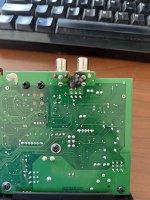Background: Had done some work on my Audio Research D70, and was getting some odd results, so I started testing and measuring with my Scarlett Solo. I had the output of the Scarlett connected to the input of the amp, and the output from the amp was connected to my speakers, and I had clips on the + and - terminals going to the input on my Scarlett. I was making connections and checking my software, when I smelled the blue smoke smell, and observed that my Scarlett seemed to be on fire. After opening it up, I saw serious black burned/melted PCB around one of the ground pins on the output jack I was using.
I wasn't running a signal into the amp during this time. The output voltage from the amp at idle was nominally zero. I didn't observe any weird voltages coming from the input jack.
I have been messing around with the output wiring in the power amp, and at least once got my signal/ground pair mixed up. That led me to wonder if improper grounding could have caused this failure? I don't fully understand why the output jack would fry like that.
I wasn't running a signal into the amp during this time. The output voltage from the amp at idle was nominally zero. I didn't observe any weird voltages coming from the input jack.
I have been messing around with the output wiring in the power amp, and at least once got my signal/ground pair mixed up. That led me to wonder if improper grounding could have caused this failure? I don't fully understand why the output jack would fry like that.
Attachments
Since it's on the ground side of the connector, it is much more likely that you had a ground potential difference between pieces of test equipment. In such situations, isolation transformers are your friend.
That makes sense. It was working fine on my bench with a desktop computer, but when I tried it in my setup with a laptop, it fried.
Could I connect the ground on my devices so they all have the same path to ground?
Could I connect the ground on my devices so they all have the same path to ground?
Maybe. But if your grounds are at different potentials then you'll just fry something else. Isolation transformers are a better option. Or Identifying and correcting the cause of your ground potential differences.Could I connect the ground on my devices so they all have the same path to ground?
Was the laptop running on battery? Kind of weird, I would have thought the desktop would more likely have the issue. Laptops (and the scarlett plugged into it) I usually expect to float. Maybe the power brick for the laptop is grounding it.
How about measuring dc potentioal between different grounds?
I have a soundcard, connected to my laptop, that sends small pop-sounds every couple of minutes when using RCA- connectors. No difference if amp input are AC or DC -cupled.
I'm using optical so I never bothered checking it up...
//Figge
I have a soundcard, connected to my laptop, that sends small pop-sounds every couple of minutes when using RCA- connectors. No difference if amp input are AC or DC -cupled.
I'm using optical so I never bothered checking it up...
//Figge
Definitely measure the ground potential between the devices. Are they three pronged power cords and if so is the ground connected to the chassis or signal ground? Measure voltage from signal ground to chassis in all devices, ideally it should be zero AC and DC. All measurements should be done AC and DC to ensure you’re not floating on an offset ground level.
You need to check your laptop power supply if you were using it at the time by measuring its DC GND on the connector to earth ground/3rd prong from the outlet.
..... and people wonder why I build with signal transformers.
..... and people wonder why I build with signal transformers.
- Home
- Amplifiers
- Tubes / Valves
- Accidentally fried my audio interface at the output jack, could this indicate a short in my amp?
